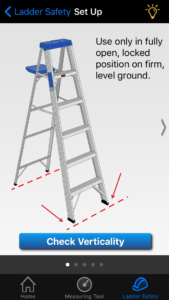A significant number of workers’ compensation claims are related to the careless use of ladders, according to the Accident Fund Insurance Company of America. The insurer reviewed its claims data and found more than 1,660 ladder fall claims occurred between 2011 and 2015.
According to the Centers for Disease Control and Prevention, 43 percent of fatal falls occurring in the last decade involved a ladder. The CDC found that men and Hispanics had a higher rate of both fatal and nonfatal falls. Self-employed workers had a significantly higher fatality rate than wage workers. Small companies also had more ladder-related fatalities. Not surprisingly, the highest number of fatalities occurred within the construction industry.

Accidents involving ladders cause an estimated 300 deaths and 130,000 injuries requiring emergency medical attention in the U.S. each year, according to the University of Missouri.
Factors that contribute to ladder falls, according to the American Ladder Institute, include haste, sudden movement, lack of attention, the condition of the ladder (worn or damaged), the user’s age and physical condition and footwear.
A Travelers Indemnity Company infographic stated that ladder violations came in at number eight of the Occupational Safety & Health Administration’s top 10 most cited standards.
To educate employers and employees on the fall hazards associated with ladders, Accident Fund has introduced a spring safety campaign.
“Ladder safety remains a major concern of ours. Being conscious of ladder safety is one way to prevent workplace accidents and keep workers safe on the job,” says David Hintz, manager of Loss Control for Accident Fund. “And it’s not only a problem in the workplace. The same things are happening around the home as people often overlook common-sense safety tips when getting on a ladder to clean gutters or to perform other routine tasks. Most of these accidents are completely avoidable.”
Loss control experts from Accident Fund are working to raise awareness of the dangers involving ladders and by providing tips to avoid accidents. The campaign addresses everything from ladder selection and setup to a variety of recommendations regarding climbing and working safely on ladders.
Ladder safety is also the focus in The National Institute for Occupational Safety and Health’s creation of a new mobile application. The agency’s first mobile application is designed to improve extension and step ladder safety. To prevent falls, the app offers a variety of guides and interactive tools, including:
- Angle Measuring Tool—Uses visual, sound and vibration signals to make it easier for users to set an extension ladder at the proper angle (approximately 75 degrees) and to check the verticality of extension and step ladders.
- Selection Tool—Provides a procedure to select the minimum required ladder duty rating corresponding to user characteristics and task.
- Inspection Tool—Includes a comprehensive checklist for ladder mechanical inspection.
- Proper Use Tool—Presents a set of rules for safe ladder use in a user-friendly format.
- Accessories Tool— Describes a number of available extension ladder safety accessories.
The app is available in English and Spanish as a free download for Apple iPhone/iPad and Google Android devices.
The American Ladder Institute recommends the three point-of-contact climb when using a ladder, because it reduces the likelihood of slipping and falling. The Institute’s website states:
“At all times during ascent, descent, and working, the climber must face the ladder and have two hands and one foot, or two feet and one hand in contact with the ladder steps, rungs and/or side rails. In this way, the climber is not likely to become unstable in the event one limb slips during the climb. It is important to note that the climber must not carry any objects in either hand that can interfere with a firm grip on the ladder. Otherwise, Three Points-of-Contact with the ladder cannot be adequately maintained and the chance of falling is increased in the event a hand or foot slip occurs.”
Was this article valuable?
Here are more articles you may enjoy.

 Tesla Sued Over Crash That Trapped, Killed Massachusetts Driver
Tesla Sued Over Crash That Trapped, Killed Massachusetts Driver  Hackers Hit Sensitive Targets in 37 Nations in Spying Plot
Hackers Hit Sensitive Targets in 37 Nations in Spying Plot  One out of 10 Cars Sold in Europe Is Now Made by a Chinese Brand
One out of 10 Cars Sold in Europe Is Now Made by a Chinese Brand  UBS Top Executives to Appear at Senate Hearing on Credit Suisse Nazi Accounts
UBS Top Executives to Appear at Senate Hearing on Credit Suisse Nazi Accounts 